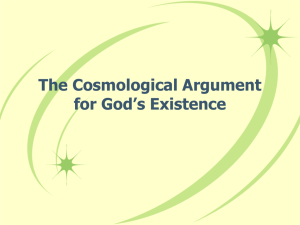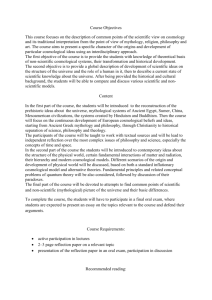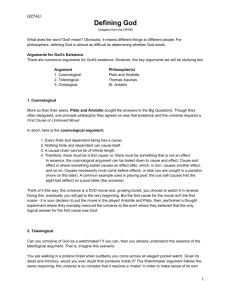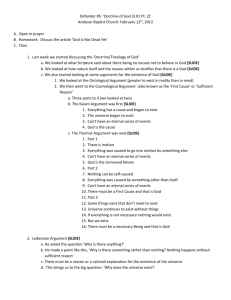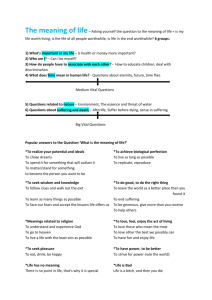Describe the cosmological argument
advertisement
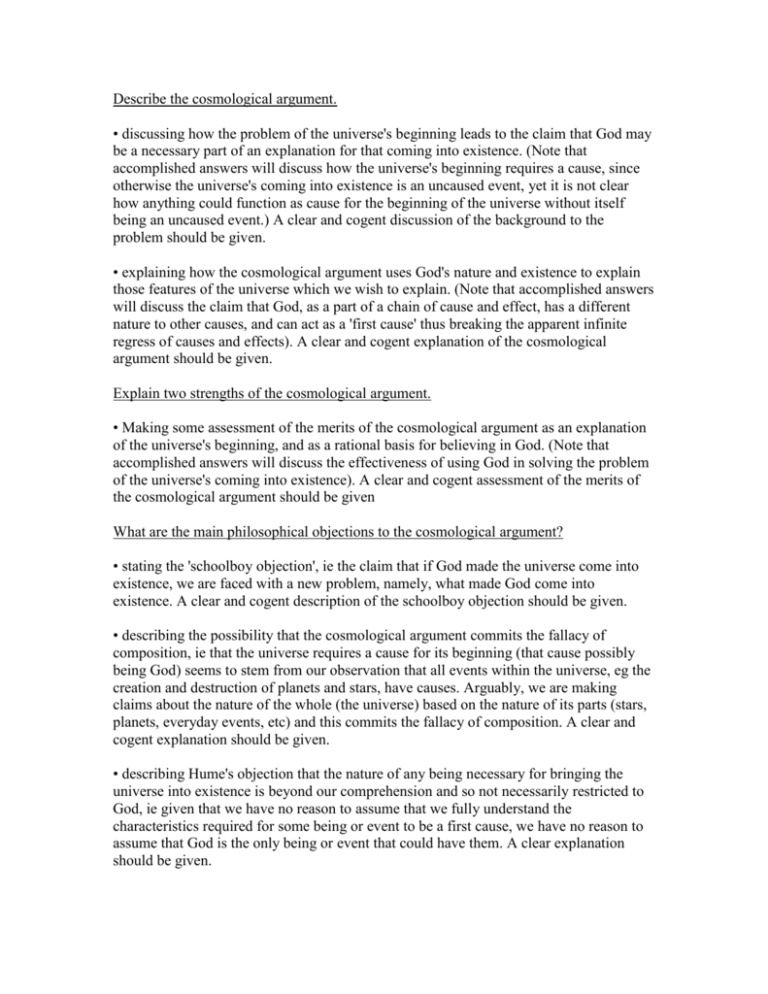
Describe the cosmological argument. • discussing how the problem of the universe's beginning leads to the claim that God may be a necessary part of an explanation for that coming into existence. (Note that accomplished answers will discuss how the universe's beginning requires a cause, since otherwise the universe's coming into existence is an uncaused event, yet it is not clear how anything could function as cause for the beginning of the universe without itself being an uncaused event.) A clear and cogent discussion of the background to the problem should be given. • explaining how the cosmological argument uses God's nature and existence to explain those features of the universe which we wish to explain. (Note that accomplished answers will discuss the claim that God, as a part of a chain of cause and effect, has a different nature to other causes, and can act as a 'first cause' thus breaking the apparent infinite regress of causes and effects). A clear and cogent explanation of the cosmological argument should be given. Explain two strengths of the cosmological argument. • Making some assessment of the merits of the cosmological argument as an explanation of the universe's beginning, and as a rational basis for believing in God. (Note that accomplished answers will discuss the effectiveness of using God in solving the problem of the universe's coming into existence). A clear and cogent assessment of the merits of the cosmological argument should be given What are the main philosophical objections to the cosmological argument? • stating the 'schoolboy objection', ie the claim that if God made the universe come into existence, we are faced with a new problem, namely, what made God come into existence. A clear and cogent description of the schoolboy objection should be given. • describing the possibility that the cosmological argument commits the fallacy of composition, ie that the universe requires a cause for its beginning (that cause possibly being God) seems to stem from our observation that all events within the universe, eg the creation and destruction of planets and stars, have causes. Arguably, we are making claims about the nature of the whole (the universe) based on the nature of its parts (stars, planets, everyday events, etc) and this commits the fallacy of composition. A clear and cogent explanation should be given. • describing Hume's objection that the nature of any being necessary for bringing the universe into existence is beyond our comprehension and so not necessarily restricted to God, ie given that we have no reason to assume that we fully understand the characteristics required for some being or event to be a first cause, we have no reason to assume that God is the only being or event that could have them. A clear explanation should be given. Which of the positions in this debate do you support? Give two reasons for your answer. Although no preferred conclusion should be prescribed and answers should be marked on how well candidates argue for their chosen conclusion based on their answers in previous sections, candidates should be awarded marks for making any of the following points in explaining whether they do or do not support the cosmological argument. • If candidates reject the 'schoolboy's objection' they should be awarded marks. (Note that accomplished answers will deal with this objection by reiterating the point that God is, by nature, different from other causes, and so does not require a further cause. This fact means that the schoolboy objection is based on a misunderstanding about the nature of God and so is not a good reason for thinking that God isn't a good way to explain how the universe came into existence.) • If the candidate assesses whether the cosmological argument's apparent reasoning from parts to wholes is illegitimate they should be awarded marks. (For example, candidates may point out that it is not always illegitimate to reason from parts to wholes. Eg whilst it is clear that reasoning from the colour of individual jigsaw pieces to the colour of the whole jigsaw is poor, it is not so obviously poor to reason from the existence of the individual pieces to the existence of the whole (especially good answers may discuss if there really is a distinction to be had here). Perhaps the reasoning from facts about universe as a whole is more like the latter than the events within the universe to facts about the former.) • If the candidate assesses Hume's objection by pointing out that this objection only entitles us to claim that God may not be the only explanation, not that God is not a good explanation then they should be awarded marks. • If candidates point out that although both God and the universe itself might have the necessary characteristics to be a first cause, an answer that does not use God is to be preferred because it achieves the same results without positing an extra entity, then they should be awarded marks.

